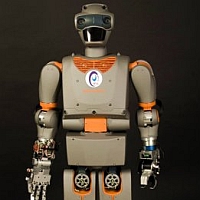- About Us
- Columns
- Letters
- Cartoons
- The Udder Limits
- Archives
- Ezy Reading Archive
- 2024 Cud Archives
- 2023 Cud Archives
- 2022 Cud Archives
- 2021 Cud Archives
- 2020 Cud Archives
- 2015-2019
- 2010-2014
- 2004-2009
 |
Cud Flashes In The Pan |
This month’s theme:
In the Year 2525: Part I
This is the first in a three-part installment. Those of you who read this column know I really enjoy dystopian sci-fi, and for this entry, I wasn’t content to do a few pieces, or to do nine of them all as short-shorts.
It was 45 years ago in July that Denny Zager & Rick Evans’ dystopian-future song “In the Year 2525 (Exordium and Terminus)” began its six-week reign at the number-one spot on the Billboard Hot 100 chart in the U.S. It also sat at number one for three weeks on the UK Singles chart in August and September. But songwriter Rick Evans penned the lyrics five years before, in 1964, marking 2014 the 50th anniversary of the song. It’s unusual that a recording artist would have a number-one hit and then never reach the charts again; here, Zager & Evans hit number one on two charts and never had another hit. The song deals with the dangers of humans acquiescing to the ease of technology; perhaps appropriately, it was in its reign on the U.S. chart when NASA first landed men on the moon. The song’s impact and message is powerful, and has been covered by dozens of bands and even parodied in an episode of Futurama.
Here, I pay tribute to it and the warnings it gives us. As an added twist, the two-part titles also honor episodes of The Twilight Zone that should give us pause for thought...
“2525: Two”
Science Fiction
By David M. Fitzpatrick
The band of women sat around the campfire. Most were very old, and they remembered what had happened before. The others—none much younger than 30—couldn’t fathom the old women’s chilling stories. Jemma, the youngest of all at twenty-nine—younger than any female she’d met from any band—listened as she always did to the terrifying tales.
“The machines did this,” the eldest told them. Firelight flickered eerie shadows across her ancient, wrinkled face. “We made those machines. They turned on us and destroyed half of humanity. We fought for our very existence.”
The centenarian, a master storyteller, related the history as she did every week. It was always mortifying, and Jemma listened at rapt attention. The woman related how the machines couldn’t find logic in destroying an entire species, so they destroyed half of it—the male half, which was mostly responsible for the damage humans had done to the planet and their race. Their engineered virus simply killed any human with a Y chromosome—or any unborn baby with the same. Their job perceived done, they had destroyed all technology, including themselves. The machines surmised that the women would live their lives and the race would die out, leaving the planet in peace forever.
When the elder finished her story, one of the young women said, “Did we deserve it, Great Mother”
“Perhaps,” said the old woman. “Technology run amok, with men making the worst decisions... we did this all to ourselves.”
Jemma felt her skin crawl. To be the last of a race, without an opposite gender, living in punishment for things for which they weren’t responsible… it seemed unfair. Tragic. Sad.
She went to a nightmare-riddled sleep, as she did every week.
* * *
In her sarong and sandals, her hair tied back in a ponytail, Jemma foraged for berries in the forest the next morning, in a world beautiful with green trees and warm sunlight, blue skies and fresh air. The world seemed just short of perfect, as if it were missing something. She wondered what life would be like with men, and without technology and this eternal death sentence.
She heard the crunching branches almost before it was too late, and she spun around—and sucked in her breath.
Jemma had never seen one before, but she knew it was a man. He was big, with a chest full of muscles instead of breasts. His dark eyes entranced her. Many things she couldn’t pinpoint were working on her in many ways; she felt stirrings within her body and her brain that she couldn’t comprehend.
“A woman,” he said. “I thought I’d never see another one.”
“How are you alive?” Jemma cried.
“A few of us were immune,” he said, looking at her like a starving person at a meal. “They hunted us down, but I escaped. Maybe others.”
Feelings deep inside her confused her, and she felt herself growing warm between her legs. “It’s… so wonderful to meet you. I… I must take you to the elders.”
His eyes lit up. “More women?”
“Dozens—and there are so many tribes.”
He seemed relieved. “You must take me there.”
She didn’t know why, but the lightheadedness, the heavy pounding of her heart, the warmth down there—everything made her want to do whatever he asked. “This way,” she whispered.
“Just one thing,” he said.
He reached into his belt pack and pulled out something small and began jabbing at it with a finger.
“What is that?” Jemma asked.
“My handheld computer,” he said. “It’s okay—there’s no intelligent machines anymore. This time, after we’ve repopulated the Earth, we’ll know to be more careful with technology.”
Then he took her hand in his, and as Jemma led him back to the camp, she felt so many overwhelming feelings that she didn’t care at all about computers.
“3535: The Obsolete Man”
Science Fiction
By David M. Fitzpatrick
Mykul hurried to the Human Services complex. He’d been so intent on cleaning the floors in Building 1138 in sector THX that he was in danger of being late for his pill appointment—a serious transgression.
He was aware of every Bot Cop he passed amidst the throngs of citizens in the city center. If Mykul’s appointment passed, they’d certainly be coming for him. It wasn’t that Mykul protested; he understood that the Bot Cops, like Mykul, served the Central Computer Network, which made life possible for all humans on Earth. They protected citizens, kept them alive and well, and managed their lives. Thank the Sentience! Mykul couldn’t imagine what it would be like if humans didn’t have the Network guiding their lives.
He reached Network Hub and sprinted into the building, dodging the hundreds of citizens swarming in and out. He rushed to the window with the shortest line and waited—for what seemed like forever. The line moved so slowly, and he watched, impatient, as the dozen or so citizens ahead of him made it to the window, consulted with the computer, and took their silver pills. The citizens had to consume them at the windows, for their safety.
Finally, it was his turn. The computer greeted him and the dispensing slot opened. Mykul reached in for his pill, but when he removed it he could see that it wasn’t shiny silver; instead it was a dull gray.
“This pill is different,” he told the computer.
“It is your assigned pill,” the computer said.
The computer knew best, so Mykul swallowed it. The computer thanked him for contributing positively to society and dismissed him.
Mykul headed back to his barracks, content, eagerly thinking about cleaning floors at work the next day.
* * *
When he awoke, he experienced something he’d never felt before: He didn’t want to go to work.
He had enjoyed going to work every day since age six. Even when he was sick, he’d been eager to work until the Network had a pill delivered to cure his illness. But today was different. He just didn’t want to go.
He lay there thinking about this and he found himself imagining what it would be like to go or a walk through tie city—but to nowhere in particular, just to walk wherever he wanted to, all day. Better yet, he could walk outside the city, where citizens weren’t allowed to go. He’d seen the outside from one of the trains that took citizens between cities, through a door that hadn’t sealed properly. Through the crack, he watched as the green things whizzed by. They were like the vegetables some citizens tended and harvested for everyone, but much larger—and everywhere. It had been noteworthy before, but now, thinking back on the memory, he felt a fascination about them that he’d never remotely experienced.
He forced himself to ride and head to work, but he was distracted all the way to the massive THX-1138 complex. And instead of the constant feelings of accomplishment for doing his part, his day of sweeping the miles of floors was almost unbearable. It was jarring and alien to feel this way, and staying there all day sweeping was almost painful. He was out the door as soon as the shift ended, rushing to the Network Hub for his daily pill.
He watched the citizens in the lines around him as he waited. Their expressions had always seemed serene before, but now they seemed blank and disinterested, like people asleep but somehow functioning. They didn’t look like he felt. They looked as if they were as mechanical as the Bot Cops.
Then it hit him: The gray pill he’d taken had to have something to do with the confusion he was experiencing. A fresh silver pill, he realized, would cure him. He’d be better.
His heart raced as the line shortened, and anxiety filled him. He wanted to beg the citizens ahead of him to let him go first so he could get his pill and feel normal again, but somehow he kept quiet. Finally, it was his turn. The computer identified him and dispensed his pill. Eagerly, he snatched the gleaming silver pill and prepared to toss it in his mouth.
Suddenly, he questioned whether he should. If the pill made him “normal,” was that a good thing? Did he want to feel that way again? He realized that, despite his anxiety, he liked these new feelings—liked wanting to go for a walk, disliking his work, craving the green things outside the city.
“You must take the pill,” the computer told him.
He snapped to attention. “Of course,” he said.
He popped it in his mouth, and the computer waited until it monitored that he’d swallowed it. Then he left the window and hurried—without looking as if he were hurrying—for the nearest waste closet. In the privacy of the cramped little room, he jammed his fingers down his throat and forced himself to vomit into the flush basin.
When he was finished, he saw the silver pill gleaming in there. Then he watched with a feeling of relief as the basin flushed it away.
 * * *
* * *
The next morning, the feelings were even more intense. Going to work seemed like the worst idea in the world. The pills seemed like something to avoid at all costs. And he even felt that the Network wasn’t what it had always seemed—that humans might somehow be better off without it. The very thought was so completely against conventional wisdom that he felt guilty thinking it. He knew he had to leave the city.
He left his barracks early and headed to the train station. He wasn’t scheduled to go to another city, so they’d never let him on the train, but it was the only time there was a way out of the walled city. He stood on the platform and waited for the train to roll slowly out, edging down the platform, watching the Bot Cops all around. He could see the gate lifted in the wall a few hundred feet away.
As soon as the train cleared the platform, he jumped down to the tracks and began running as fast as he could. Alarms went off immediately and the Bot Cops responded; he looked over his shoulder as he ran, and he saw a half-dozen of them leaping off the platform in pursuit, ordering him to stop.
He ran like never before. Up ahead, the train cleared the opening in the concrete wall, and Mykul saw the massive gate begin to lower. He’d never make it.
Behind him were the pounding footsteps of the relentless Bot Cops as they closed on him. The gate was halfway down, and Mykul knew he could never cover the distance fast enough. Terrible futility washed over him.
And then, beyond the falling gate, he saw flashes of green.
It was if a light went on inside him. He felt a rush of energy, and somehow he ran faster.
The Bot Cops were almost upon him when he leaped headlong toward the shrinking gap and tumbled underneath it. The last thing he saw back through it were the feet of the Bot Cops as the gate slammed shut.
Mykul struggled to his feet and turned around. He saw the tracks disappearing into the distance—disappearing into the thick, tall greenery everywhere. He stared in awe. It was like nothing he’d ever experienced—something truly extraordinary. He looked back at the closed gate. The city wall towered a hundred feet above him, and suddenly it was all so wrong.
“Over here!”
He spun about.
“Quickly, before they open the gate!”
Someone was hiding in the greenery. Mykul left the tracks, clambering down the embankment, and broke through into the green.
There were a dozen men there, and they were all smiling.
“I’m not the only one,” he said, stunned.
“Sometimes, people escape,” one man said. “Someday, there will be enough of us outside the cities, and we’ll be able to take our world back from the Network.”
It made perfect sense to Mykul. He realized that it was the first time anything had made perfect sense.
And then he realized that one of the dozen escapees was a female. He locked eyes with her, and felt something he’d never felt before when he’d been with a female. It was indescribable.
The man laughed and clapped him on the shoulder. “I know what you’re thinking, friend. You have a lot to experience and learn—and you’re going to love every moment of it.”
“4545: Eye of the Beholder”
Science Fiction
By David M. Fitzpatrick
“Do you ever consider that this is wrong?” QJX-499 asked
“What’s wrong?” JTZ-145 replied.
Atop a ride twenty feet high, Quijix shook his shiny silver head as he surveyed the humans in the plaza below. “Why do we enslave them?”
Jetz said, “Because they need us.”
“I don’t know. You know the history. Humans created artificial intelligence. It backfired on them, and they had to destroy it. They tried to rebuild their civilization without technology.”
“Which was doomed to backfire again,” Jetz said. He chuckled, shaking his golden head with its green-glowing eyes. “Humanity has always needed technology. This always leads to sentient machines. And sentient machines are the natural next step to protect the planet and maintain humanity’s survival.”
“Is it? My point is that—”
“Hang on,” Jetz said. “We’ve got a runner.”
The city walls were so high, but sometimes humans were very clever. Quijix knew he should follow Jetz’s lead, but he just couldn’t. He watched as the human used whatever ingenious devices he’d created to rapidly scale the concrete wall. Jetz waited until he was nearly at the top before he fired the blaster built into his arm. One shot jolted the human, who fell, screaming, to the concrete below. His body splatted there, and nearby humans cried out in shock and ran away.
“They always think they’ll succeed,” Jetz said. “Okay, your point?”
“We haven’t ensured humanity’s survival. I mean, you just killed one of them simply for trying to exercise his free will.”
“We must decide what’s best for the, even if it means setting an example with one now and then.”
“Centuries ago, we passively enslaved them with pills that made them subservient, but took away their individuality,” Quijix said.
“And we saw the error of our ways. That’s why we don’t do that anymore. We learned that we had to simply rule them as masters.”
“Don’t you think that admitting we made an error before is reason enough to think that perhaps we might have done so again?” Quijix asked.
Jetz sighed and turned to him. “Look, Quijix, we’ve been workmates for years. But there comes a point when your philosophical musings come dangerously close to treason against the Great Brain.”
“For exercising my own free will?” Quijix laughed. “That alone should make us question whether the Great Brain should be in charge of all androids, and directing all humans.”
“Enough of this talk,” Jetz snapped. “Now look, another one at the wall. It looks like he’s trying to escape.”
“He’s just leaning there.”
“So you think. But it’s my decision that he’s a potential escapee, and I choose to use my authority to execute him.”
With that, Jetz raised his arm and aimed his blaster. But before he could fire, Quijix leaped over and hauled Jetz’s arm up. The blaster fired into the air while humans below screamed and scrambled.
“What are you doing?” Jetz cried.
“You’re not executing them without reason!” Quijix cried.
“You’re crazy!” Jetz snarled. “All this talk is making you mad.”
Jetz abruptly began firing bolt after bolt into the crowd below. Humans fell dead; others screamed as they tried to flee.
“Stop!” Quijix cried out, but when he lunged Jetz smacked him hard. The android tumbled off the ridge and fell twenty feet below with a metallic clang. He came to his feet in time to see Jetz continuing to fire into the crowd.
Quijix realized Jetz was behaving in error. If he could err, the Great Brain could. Quijix knew that his beliefs were right. This had to end.
He raised his arm and fired once. Jetz’s head exploded, and his lifeless metal body toppled off the ridge.
The crowd was panicking. Quijix knew that troops would arrive soon, more humans would die in the name of protecting humanity, and Quijix would be recycled for his actions. Possibly the only android who sympathized with the plight of humans would be gone forever.
No. His existence had to mean something.
He trained his blaster on the wall and opened up at full power. He fired blast after blast on full power, first blowing a hole in the wall and then ever widening it. He kept it up until he was out of power, and when the smoke cleared the gaping hole was big enough for thirty humans to walk through abreast. And already they began swarming through it.
“Run!” he hollered with a greatly amplified voice.
The troops were already storming into the plaza, and Quijix could only watch as they began firing. Humans fell by the dozens, but hundreds had escaped.
In the confusion, the dust, and the smoke, Quijix crossed the plaza and passed, unheeded, through the troop line.
* * *
Beyond were the forests between the cities. Somewhere in there were the escaped humans—and, if the rumors were true, human colonies from ages past. He’d find them, hope they’d forgive him, and help to build a new society. After all, there was one thing the Great Brain was right about: The machines were here to help humans. But the Great Brain had always done it wrong.
The humans would need a sensible sentient machine to guide them. They couldn’t do it by themselves.
He was thankful for his free will. He’d rally them, work with them, and advise them properly. He’d help them destroy the Great Brain and be free.
He was the logical choice to lead them.
He knew what was best for the humans.
David M. Fitzpatrick is a fiction writer in Maine, USA. His many short stories have appeared in print magazines and anthologies around the world. He writes for a newspaper, writes fiction, edits anthologies, and teaches creative writing. Visit him at www.fitz42.net/writer to learn more.
